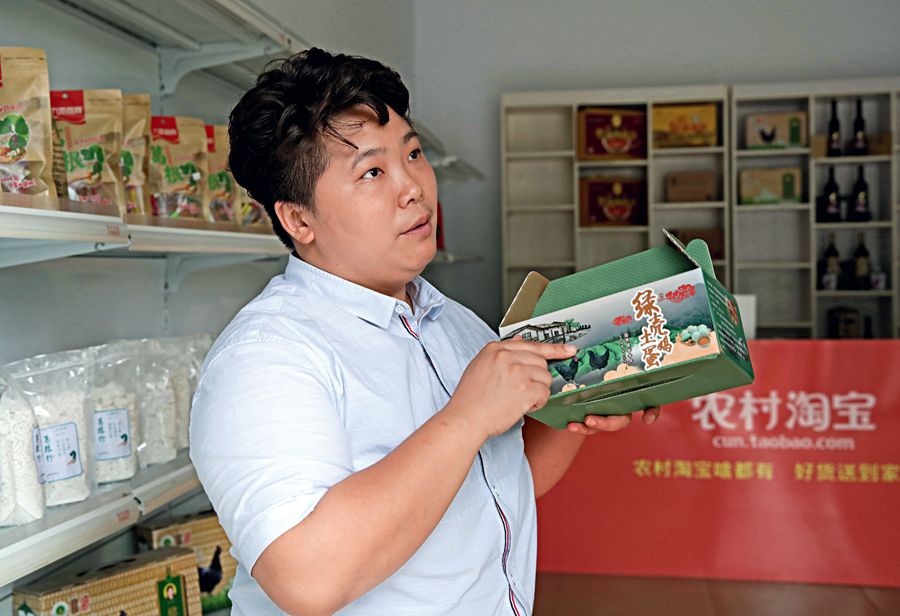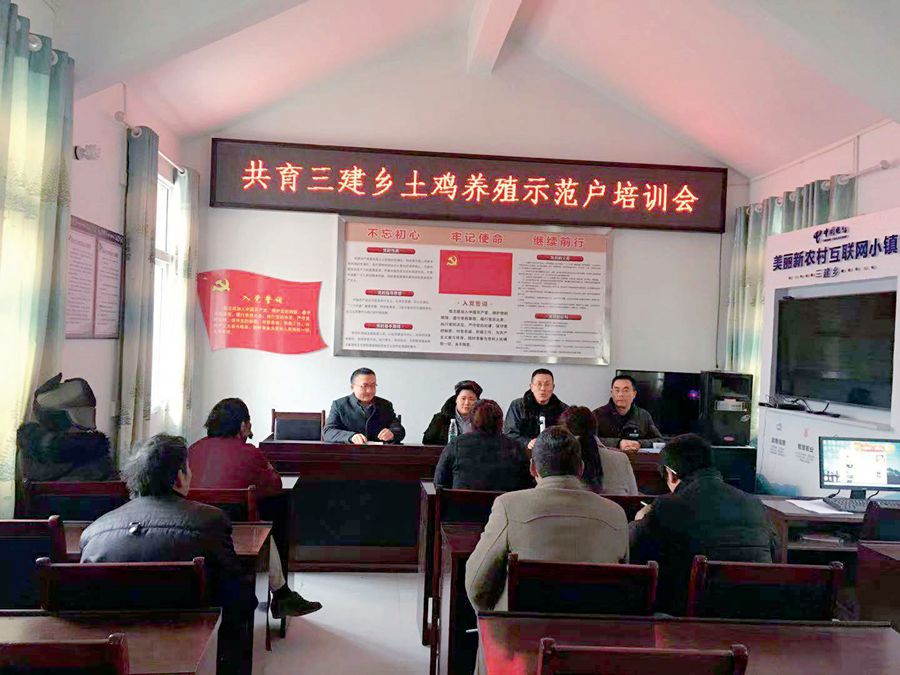IN China, the most underdeveloped areas have been stuck in poverty due to their geographical isolation and poor accessibility. Because local agricultural products cannot be sold to the rest of the country, nor can commodity goods in the city enter the rural market, the gap between rural and urban areas continues to widen.
Now, the burgeoning e-commerce industry is playing a major role in the fight against poverty in rural areas like Fengdu County.
China is promoting e-commerce in rural areas. Against this background, Fengdu is exploring ways to achieve the targeted poverty alleviation model of “rural e-commerce brokers + impoverished households,” making e-commerce a new engine for pushing forward rural revitalization and eliminating poverty.
Yang Mei, deputy director of Daxi Village Committee, Wuwei Town, Fengdu, says, “The best way to sell our rural agricultural products is to develop e-commerce.”
With express delivery service reaching all communities in the county, e-commerce has covered 176 villages in 30 townships (sub-districts) in the county, and 93 e-commerce integrated service stations have been built in 138 poverty-stricken villages in the county, with a coverage rate of 67 percent.
Now, e-commerce brokers are spearheading economic development in these poverty-sticken rural areas.
Profitable Pumpkins
Tianshui Village of Xingyi Town, Fengdu, is a small village with a poor economic base. Zhang Yuan, 33 years old, worked previously as waiter, chef, and telephone sales representative in Beijing, and had three failed entrepreneurial experiences. Now he is an e-commerce business broker. The young man coming from the countryside always smiles with the belief, “Even though you’ve tried and failed before, it doesn’t matter; try again.” With the unrelenting spirit of entrepreneurship, he has helped people in the village shake off poverty and become prosperous.
In 2015, Zhang returned back home from city life and created an online business. In 2017, he participated in the rural Taobao e-commerce training organized by the county’s e-commerce office. Since then, with the help of the office he has set up his own shop on Taobao, China’s largest e-commerce platform.
The first business idea he had was selling waxy corn online. “I planted 0.7 hectares of waxy corn, and was ready for a big deal. But who would have thought that orders dried up after only two weeks,” said Zhang, adding that since he had no cold storage facilities, the freshly picked corn became old after half a month. At that time, relatives, friends, and fellow villagers thought Zhang was insane with his e-commerce scheme, which didn’t make a penny.
Zhang Yuan, an e-commerce broker in Tianshui Village, Xingyi Town, Fengdu County.
Despite people’s taunts, the enthusiasm of Zhang’s entrepreneurship was not dampened. “If the corn did not sell well, then I will sell pumpkins and green beans.” He sold pumpkins planted by the villagers online for RMB 16.9 each. It was unexpected that pumpkins would top the best-selling categories at his Taobao shop. As a result, everyone got a completely new appreciation of his job.
With the experience of selling pumpkins last year, this spring, Zhang bought pumpkin seeds and handed them out to villagers, encouraging everyone to plant pumpkins.
“Pumpkin planting has reached 10 hectares now, and among the farmers who have signed the contract with me, more than 20 of them are from poor households,” said Zhang. He added that at present, the pumpkins in the village are growing well, and the total output can reach 100 tons. According to last year’s market, if pumpkin sales amount to RMB 200,000, it can help increase the incomes of local residents by more than RMB 2,000 on average per household.
In order to meet the long-term needs of his e-commerce store, Zhang also sells agricultural products online such as pears, plums, bacon, kidney beans, eggs, and sweet potato powder, all produced by the villagers. “By developing rural e-commerce business, the lives of the villagers will get better and better.” Zhang said that he has confidence in the future of himself and his fellow villagers.
Huang Hong, deputy director of Fengdu County Commercial Committee, said that since 2017, Fengdu has established 141 rural e-commerce service stations, mostly headed by tech-savvy young people who have a good understanding of relevant skills. As a result of their efforts, some previously considered to be unsellable agricultural products are sold throughout the country, greatly increasing the income of impoverished rural families.
“In 2018, taking advantage of this model of rural e-commerce brokers + poor households, we sold more than RMB 10 million worth of agricultural products online, directly lifting more than 2,000 poor households in the county out of poverty and helping increase the income of local residents,” said Huang.
Eggs Sold as a “Luxury Product”
An ordinary egg can be sold as high as RMB 1.5, and a box of six green-shell eggs can be sold for as much as RMB 36. The overall online sales volume of the egg business reached millions of yuan in a year. E-commerce has created a booming egg business in Daxi Village of Huwei Town.
Yang Mei travels to the neighboring poverty-stricken village to train poor households in poultry husbandry.
It is Yang Mei, deputy director of the village committee and an e-commerce broker, who has enabled villagers to earn high incomes through selling eggs.
Yang used to be engaged in contracting projects in Guangzhou, but then gave up her urban life in a big city and returned home to set up her own online business in 2014. In 2016, she was elected as the deputy director of the village committee. She believed that old conventions would hinder people from being innovative, and she began looking for ways to be innovative and diversify her business model.
The situation in the village at the time Yang returned home frustrated Yang. “Young people were going out to work, leaving behind the elderly and children. As the old people had to do farm work while taking care of children, despite the laborious work, the agricultural products found few buyers.” Yang said the backward economy in the village had hardly changed during her years in Guangzhou.
Because of the connections she had made while working in Guangzhou, when Yang put the agricultural products of the village on her WeChat moments, everyone rushed to buy them. “Due to the limited recipient scope of information released on WeChat, purchases are only limited to friends. If you don’t sell them in large quantities, you won’t have big benefits,” said Yang.
With the help of Fengdu County Spicy Brothers Food Co., Ltd., she began to breed hens that lay green-shell eggs. At the same time, she continued to improve herself through learning. “The best way to sell our agricultural products is to develop an e-commerce business.” She said.
In 2015, in order to better integrate poverty alleviation funds, Weiwu Town launched an industry-backed poverty alleviation program for impoverished villiages. Daxi Village received assistance from the government in this program. “We distributed baby chicks to the villagers, but due to their lack of cultivation techniques and experience, the survival rate was not high.”
At this point, Yang was becoming quite anxious. She was the first to set up a professional chicken cooperative in the village via policy support to mobilize poor households and farmers who were willing to raise chickens to join the cooperative.
Yang participated in the breeding training organized by the county government many times, and repeatedly consulted breeding experts for professional farming techniques. Soon she became an expert in green-shell chicken breeding, and the neighboring village even invited her to give training classes every month.
Yang Fengwei has four members in her poverty-stricken family, and her child is still in school and her mother-in-law suffers from an illness all the year round. “The only source of income for the family was her husband who worked as a migrant worker.” Upon hearing that, Yang Mei encouraged her to join the chicken cooperative and made arrangements for her to get chicks through the poverty alleviation policy. Now the sales of green-shell eggs hatched by her 40 hens can bring her a net imcome of RMB 8,400 a year. Yang said that eggs from poor households are given priority on the e-commerce platform.
The 52-year-old Chen Wanxi’s family was also living a difficult life. His wife is mentally retarded and daughter in poor health. Thanks to the help of the village chicken cooperative, Chen raised 200 green-shelled hens, and the net income of selling eggs per year now reaches RMB 60,000, which has brought his family out of poverty.
In addition to eggs sold online, Radix Puerariae powder, honey pomelo, mulberry wine, and chestnut rice have also become top-selling products in Yang’s rural e-commerce store. “Fruit eggs,” from hens fed with vegetables and fruits, is sold for as much as RMB 6 each.
The number of green-shelled chikens, a unique Chinese poultry species, raised in Daxi Village is currently 11,000. They produce 5,000 eggs per day. In addition to online sales, Yang has also developed a cooperative relationship with large enterprises, school canteens, and signed long-term supply contracts with local enterprises, all of which has helped form the development model of “online sales + enterprises + professional cooperatives,” benefiting 385 villagers.
With the development of the logistics industry in China, rural e-commerce service stations have covered more than 30,000 villages of nearly 700 counties in 29 provinces, municipalities, and autonomous regions. Zhang Yuan and Yang Mei are among the 60,000 e-commerce brokers providing various services to the villagers. E-commerce has become an important way of lifting people out of poverty in underdeveloped rural areas.


